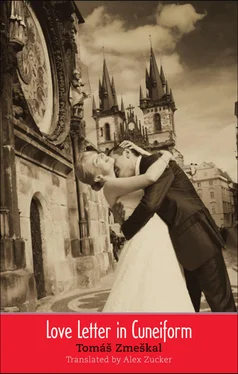Hynek Jánský owed his successful career not to hard work or talent, but to the humble fact that he realized the most important thing of all was dull, boring, tiresome, if not outright dreary patience. It was an insight so banal it was almost frightening. Most people were proud, and almost everyone, including Květa, thought they were special, exceptional, unique. But he, Hynek Jánský, doctor of both laws, knew and was proud of the fact — as proud as if he had discovered some timeless law of nature — that he was exactly the same as everyone else. He was proud not to be unique or exceptional, proud to be patient and utterly conformist. He won his tennis matches by avoiding risk, playing from the baseline, no crushing overheads or clever lobs, not him. Instead he waited to capitalize on his opponent’s errors, silently and sweatily chasing down every ball, for as long as his strength held up. His shots never skimmed the net or landed dangerously close to the line. He hit them three feet inside the court, and he was the one who won.
Květa’s behavior would be entirely predictable, entirely unexceptional, the same as that of all the other wives of the convicted men. It made no sense to expect anything original or out of the ordinary, for the simple reason that it made no sense to expect the impossible.
First, then, in a few weeks, Květa would turn desperate. She and her beautiful face, with her filly’s hips and her exalted stride, would fry in a hell of anxiety. At night, generally between two and four in the morning, she would wake and start sobbing, sobbing uncontrollably, until she understood that the thing she feared the most was in fact what was going to happen. She would swallow tears until her eyes dried out and the circles under her eyes smelled of sand, until her eyes were dry and bloodshot, like a mirage that refuses to disappear, like the neon signs that shine at night on every corner, and then she would see him everywhere, at every turn.
During that period, Hynek would avoid any contact with her. Perhaps a meeting or two in public, twenty or thirty minutes at most. It was important to give her hope, but he had to be noncommittal, he couldn’t compromise himself, and he definitely had to avoid getting into any situation where she threw her arms around his neck and started to sob. That would be foolish and asexual, reinforcing feelings of bonding and cohesion, in other words brotherly, which was the one direction he didn’t want it to go in. He would wait until after the worst of the pain had passed, and the weariness and bottomless heartache began to settle in … and along with them, naturally, rage at the one who had been arrested, locked up, and tortured, rage at the convicted man himself. Yes, Květa would get angry at her dear husband, Josef.
That’s the way it always is. People have always blamed the dead, the ones captured or killed, or failed to protect them. That’s the way it always is, and that’s the way it’s always been. How long this phase will last is difficult to know. Once it ends, Květa will stop crying. She still won’t sleep well and she’ll feel guilty, but that’s all. And when it happens, Hynek will be nearby. The next phase can be identified by the fact that her eyes are no longer red from crying all night and the circles beneath them are deeper. He’ll be nearby when that happens. And then, a few months later, she’ll finally come to terms with the fact that her husband is going to be locked up for many years. Gradually she will learn to accept it, she can settle down and stop carrying on and discover that it’s possible to live just for her children and then … finally, at the very end … comes the first hesitant realization that she also needs to do something for herself from time to time. She discovers that she doesn’t have to spend every waking moment thinking about the concentration camp where her husband is rotting away and will continue to rot away for the next thirteen years. Then, out of the blue, yes, all of a sudden she discovers that she’s still a woman too.
This phase would last several months, although the individual stages of the process could be catalyzed or accelerated. It may have been irritating and unpleasant that it lasted as long as it did, but Hynek’s patience had rarely betrayed him.
After a few months, Josef was convicted and sentenced to thirteen years in prison. He would be released in 1963. Květa had lost weight, her scalp had sprouted a few gray hairs, and the circles under her eyes were visible from a distance. Hynek said that although there was nothing he could do during the legal proceedings, he could help Josef once he was convicted by ensuring he was sent to a less harsh correctional camp, a less harsh concentration camp. By now Květa had come to terms with her fate and the crystalline logic of despotism. She was grateful to Hynek for helping Josef. Every now and then Hynek would turn up out of nowhere, sometimes with hard-to-find items. About a week after Alice’s first birthday, he showed up at Květa’s door with a carefully wrapped, delicious-smelling paper bag. When he opened it and took out the oranges, the scent flooded through the apartment like a river, in one spot hanging in the air like a lake, in another just a thin trickle, and in yet another cascading like a waterfall. Hynek’s visits never lasted more than a half hour; sometimes Květa even wished he would stay longer. But he needed only a few minutes to plumb the depths of despair in her eyes. His rich experience had given him an infallible sense for distinguishing which level of personal hell the poor husbands and wives of the convicted were on at any given moment. When Květa came to Hynek’s office after the verdict was pronounced, he wrote his address down for her in a few quick, precise strokes, whispered to her not to come to his office anymore, and to stop by his place if she wanted anything. She stopped by roughly one month later. By that time her mother, too, had gotten used to the fact that her daughter had lost her husband for the next thirteen years. The husband of one of her friends, a man of over seventy, had also been arrested. He had lost so much weight by the time of his trial that the only way she had been able to recognize him in court was by his mustache. Also his hair, which until recently had been brown, turned white. It was hard to believe the man the communist court rewarded with a sentence two years longer than Josef’s, allowing him to celebrate his eightieth birthday in a uranium mine, would even manage to survive. The fact that neither man was a criminal was unimportant; the implacable geometry of power liquidated anyone defined as an enemy in the context of the class struggle.
Květa’s mother felt her strength leaving her and sensed she wouldn’t live to see Josef’s return. She hadn’t said anything to Květa yet, but with the wisdom of the old, the wisdom that comes from recognizing one’s own weakness, she tried to spend as much time as she could with her granddaughter. Květa had reached the final stage of pain by that point, and was reconciled to her fate. The week before she went to see Hynek she bought herself a new skirt. Years later, probing her conscience, she still wasn’t sure whether it had been a coincidence or whether the cunning voice of her subconscious had seized the opportunity.
It was early spring when she went to see him. Hynek brewed a cup of Brazilian coffee, which you couldn’t find in ordinary stores, while Květa looked out at the blooming trees lining the embankment. She held her cup in both hands, enjoying the sensation of breathing in the bitter aroma as she stood staring out the window with the hot porcelain burning her hands. Hynek went to the kitchen for sugar, but on his way back he came to a stop in the doorway, surprised. Seeing the flirtatious smile on Květa’s face as she gazed out at the tree blossoms, he knew his days of harsh self-discipline would soon be a distant memory. She took a sip of the coffee and rose from her chair to lean against the windowsill. The way her puffy skirt flowed over her hips, accentuating her buttocks, the way the color had returned to her face with the hesitant application of cheap powder, these things spoke volumes. Together with her thin blouse and the growing warmth of the spring day, all of this compelled Hynek to ask:
Читать дальше












